The 5 Best PCT (Procalcitonin) Tests – 2025
Odemshop
AuthorToday, hundreds of PCT Tests are available on the market. We spent 100 hours comparing the top options to find the best 5 PCT tests to help you quickly and accurately detect bacterial infections. What are the Best PCT Tests? 1. RightSign PCT Semi-Quantitative Rapid Test Cassette Our Result: Best Price / Performance Ratio Among Listed […]

Today, hundreds of PCT Tests are available on the market. We spent 100 hours comparing the top options to find the best 5 PCT tests to help you quickly and accurately detect bacterial infections.
What are the Best PCT Tests?
- RightSign PCT Semi-Quantitative Rapid Test Cassette – Best Price / Performance Ratio Among Listed Tests
- Cleartest® Procalcitonin (PCT) – Best for High Market Acceptance in EU & European Suppliers
- Accu-Tell® PCT Rapid Tests – Provide Fast Results in Just 5 minutes
- AllTest PCT Rapid Test
- Elecsys® BRAHMS PCT
1. RightSign PCT Semi-Quantitative Rapid Test Cassette
Our Result: Best Price / Performance Ratio Among Listed Tests
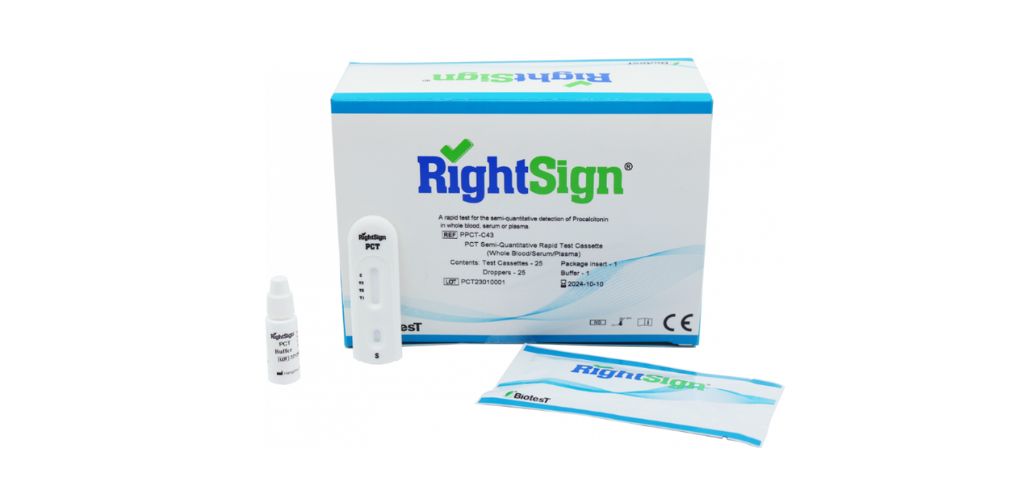
RightSign PCT Semi-Quantitative Rapid Test Cassette is essential for quickly determining procalcitonin levels, aiding in differentiating bacterial and viral infections. It is crucial for guiding antibiotic use and combating resistance. It should be trusted for swift results in critical scenarios. CE marked for professional use; shelf life: 12 months.
The Best Part:
- Provides quick results, enhancing capabilities for urgent care needs.
- Offers semi-quantitative results for reliable procalcitonin level assessment.
- Shelf life extends up to 12 months, ensuring prolonged usability.
The Worst Part:
- Limited availability in some regions.
Details
- Sample Type: Serum, Plasma, Whole blood
- Results: 10minutes
- Intended for Professional Use
| Sensitivity | 96.6% |
| Specificity | 99.0% |
Get it if you want swift determination of procalcitonin levels, aiding in differentiating bacterial and viral infections. This enhances timely decision-making in critical care settings.
We recommend you use this product for its reliable semi-quantitative results, which are ideal for guiding targeted antibiotic treatments and combating resistance. For affordable and reliable shopping, shop online from OdemShop.
Fair Price & Secure Purchase2. Cleartest® Procalcitonin (PCT)
Our Result: Best for High Market Acceptance in EU & European Suppliers
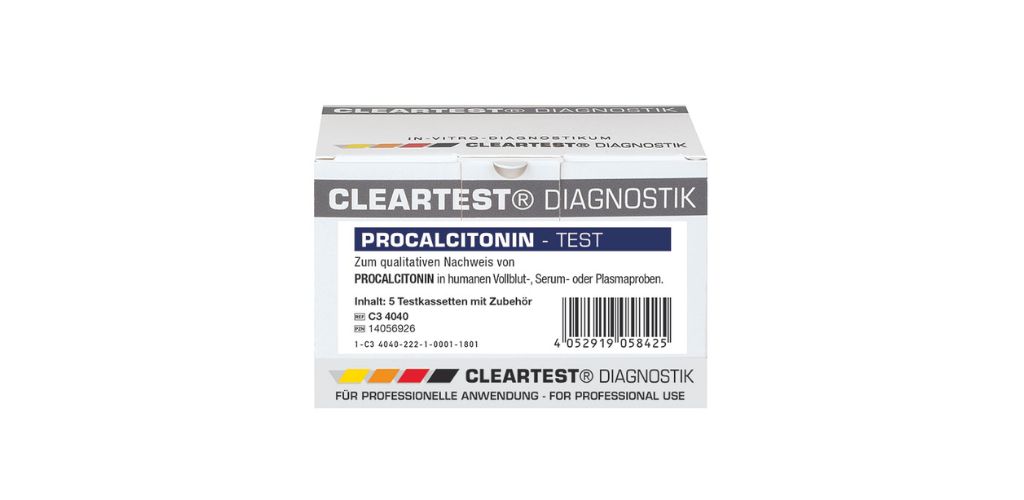
The CLEARTEST® Procalcitonin (PCT) is a rapid test designed for diagnosing and monitoring serious bacterial infections and sepsis. It should be used to detect early procalcitonin levels, aiding in distinguishing between bacterial and viral infections. This test helps guide therapy choices and assess the effectiveness of antibiotic treatments.
The Best Part:
- Well-known European Supplier
- Rapid test for diagnosing and monitoring serious bacterial infections effectively.
- Offers reliable information early to distinguish bacterial from viral infections.
The Worst Part:
- You’ll find this test has high market acceptance in the EU, but its higher price point compared to listed PCT tests might be a consideration.
Details
- Sample Type: Whole Blood/Serum/Plasma
- Results: 15 minutes
- Intended for Professional Use
| Sensitivity | 98.7% |
| Specificity | 98.9% |
Get it if you want early detection of severe bacterial infections through the biomarker procalcitonin. This helps in distinguishing bacterial from viral infections, guiding effective therapy choices.
We recommend you use this product for its rapid evaluation and reliable insights, essential for professional diagnosis and treatment planning.
3. Accu-Tell® PCT Rapid Test
Our Result: Provide Fast Results in Just 5 minutes
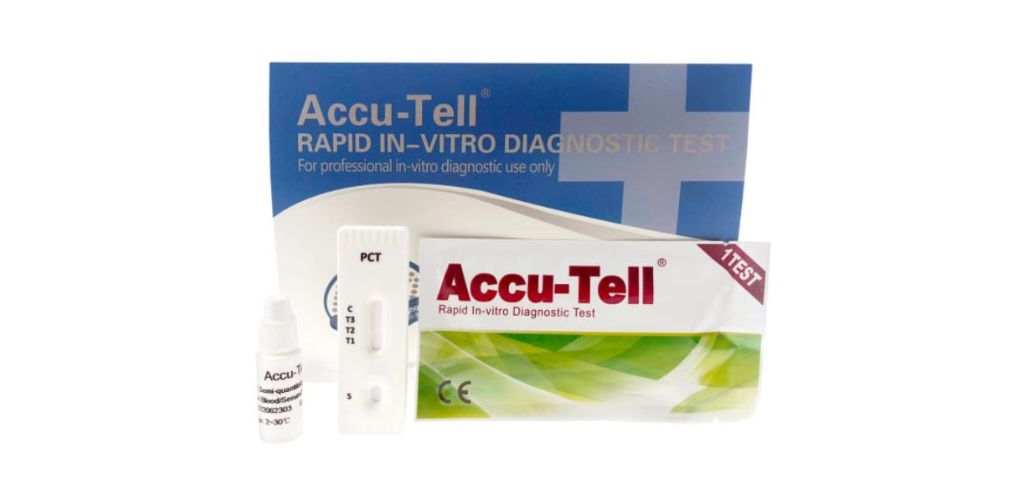
The Accu-Tell® PCT Rapid Test from AccuBioTech is a chromatographic immunoassay for semi-quantitative detection of procalcitonin in blood, serum, or plasma. It delivers reliable results in just 5 minutes with a relative accuracy of up to 98.1%. The test is CE-certified and intended for in vitro diagnostic use by trained personnel.
The Best Part:
- Designed for semi-quantitative detection of procalcitonin in various samples.
- Ensures no cross-reaction with other substances for accurate results.
- Provide Fast Test Results in Just 5 minutes
The Worst Part:
- This test only indicates the semi-quantitative level of PCT in the specimen and should not be used as the sole criteria for evaluating inflammatory conditions.
Details
- Sample Type: Whole Blood/Serum/Plasma
- Results: 5 minutes
- Intended for Professional Use
| Sensitivity | 96.6% |
| Specificity | 99.0% |
Get it if you want semi-quantitative detection of procalcitonin with fast results in just 5 minutes. This test ensures high accuracy and no cross-reactions, aiding in precise diagnostics.
We recommend you use this product for its chromatographic immunoassay technology, ensuring reliable results exclusively for medical professionals.
4. AllTest PCT Rapid Test
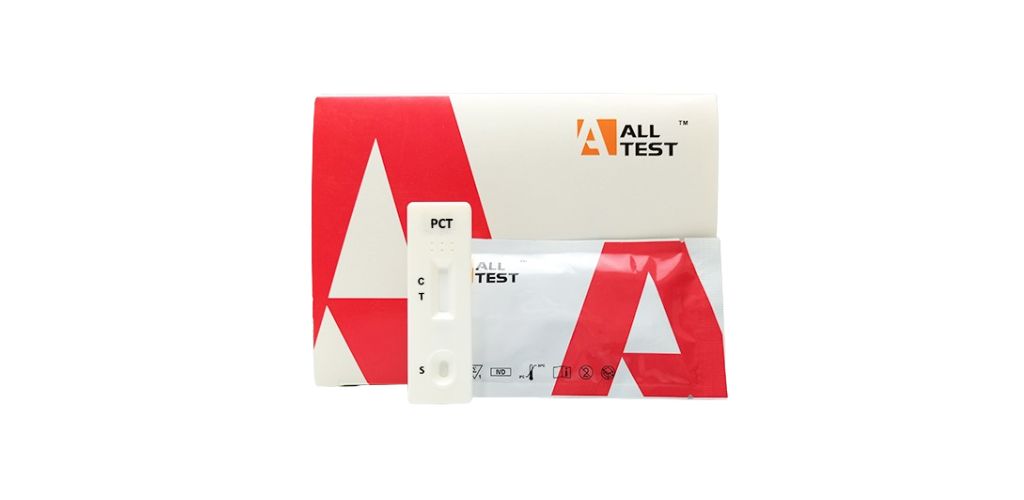
The AllTest PCT Rapid Test is a rapid chromatographic immunoassay for the qualitative detection of Procalcitonin in blood, serum, or plasma. It provides fast results in 15 minutes with high accuracy. It should be noted that the test offers easy visual interpretation and simple operation with a shelf life of 2 years.
The Best Part:
- A shelf life of 2 years ensures long-term usability.
- Designed for the quantitative detection of Procalcitonin in serum, plasma, or blood.
- Features a simple operation, requiring less training for effective use.
The Worst Part:
- Lower market awareness compared to similar products.
Details
- Sample Type: Whole Blood/Serum/Plasma
- Results: 15 minutes
- Intended for Professional Use
| Sensitivity | 98.7% |
| Specificity | 98.9% |
Get it if you want rapid qualitative detection of Procalcitonin in whole blood, serum, or plasma. It offers fast results in 15 minutes with high accuracy and easy visual interpretation.
We recommend you use this product for its simple operation and objective results, ensuring effective and reliable detection without extensive training.
5. Elecsys® BRAHMS PCT
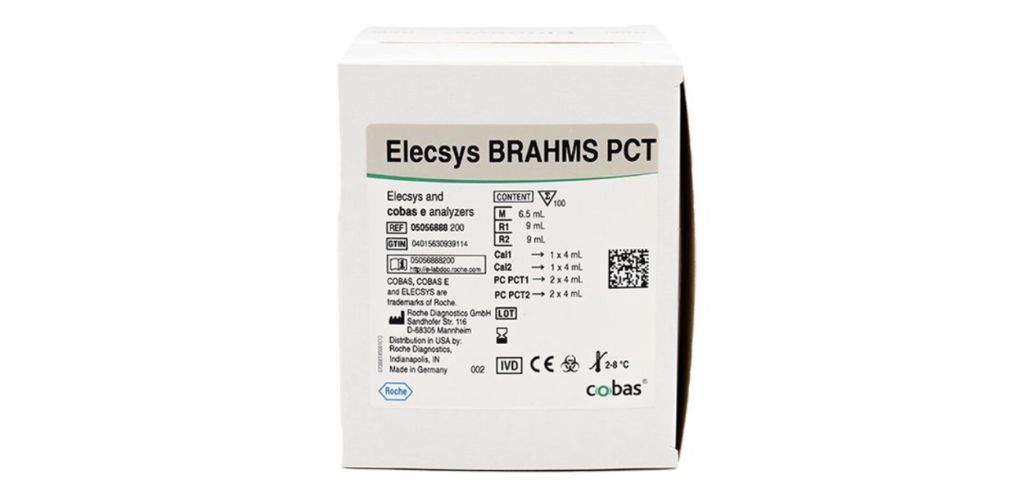
The Elecsys® BRAHMS PCT is an ECLIA designed for determining procalcitonin in serum or plasma using Roche Elecsys® analyzers. It should be used for early detection of bacterial infections, assessing infection severity, and monitoring antibiotic therapy. This test is CE marked and FDA 510(k) cleared for reliable diagnostics.
The Best Part:
- Enables early detection of clinically significant bacterial infections effectively.
- Compatible with all cobas e analyzers for versatile application.
- Requires a low sample volume and offers a wide measuring range for convenience.
The Worst Part:
- You need a Cobas – Machine from Roche for detection, which limits the easy of use.
- 66% is an increible low Specificity with additionale the lowest sensitivity among the top 5 tests listed
- Highest result time of 18 minutes, exceeding that of the top 5 listed products.
- Detection is limited to the presence of PCT in Serum only.
Details
- Sample Type: Serum
- Results: 18 minutes
- Intended for Professional Use
| Sensitivity | 96.0% |
| Specificity | 66.0% |
Get it if you want automated support for clinical decision-making in managing sepsis. It assists in the early detection of bacterial infections and evaluating the effectiveness of antibiotic treatments.
Its recommended to use this product for its ECLIA technology on cobas e analyzers, ensuring precise and reliable diagnostics.
Here is a short comparison of our top 5 PCT Tests
| PCT tests | Winner for |
| RightSign PCT Semi-Quantitative Rapid Test Cassette | Best Price / Performance Ratio Among Listed Tests |
| Cleartest® Procalcitonin (PCT) | Best for High Market Acceptance in EU & European Suppliers |
| Accu-Tell® PCT Rapid Test | Provide Fast Results in Just 5 minutes |
| AllTest PCT Rapid Test | |
| Elecsys® BRAHMS PCT |
Here is a Detailed comparison of our top 5 PCT Rapid Tests
| Manufactured by | RightSign PCT Semi-Quantitative Rapid Test Cassette | Cleartest® Procalcitonin (PCT) | Accu-Tell® PCT Rapid Test | AllTest PCT Rapid Test | Elecsys® BRAHMS PCT |
| Sensitivity | 96.6% | 98.7% | 96.6% | 98.7% | 96.0% |
| Specificity | 99.0% | 98.9% | 99.0% | 98.9% | 66.0% |
| Sampling Method | Serum, Plasma, Whole blood | Serum, Plasma, Whole blood | Serum, Plasma, Whole blood | Serum, Plasma, Whole blood | Serum |

Immediate Care: Identify Bacterial Infections Today!
Click now to explore our PCT Tests for infection detection!
Here are the top 20 PCT Rapid Tests that we considered in the comparison
- RightSign PCT Semi-Quantitative Rapid Test Cassette
- Cleartest® Procalcitonin (PCT)
- Accu-Tell® PCT Rapid Test
- AllTest PCT Rapid Test
- Elecsys® BRAHMS PCT
- RapidFor Procalcitonin (PCT) Rapid Test Kit
- RaFIA Procalcitonin FIA Test
- AMP Procalcitonin Rapid Test
- Check-1 Procalcitonin Quantitative Rapid Test
- SCREEN TEST PROCALCITONINA
- AFIAS PCT Test
- Finecare PCT Rapid Quantitative Test
- RayBiotech PCT Test Kit
- Abbexa Human Procalcitonin (PCT) Rapid Test Kit
- RapidLabs PCT Test
- Biopanda PCT Rapid Test
- Biotime PCT Rapid Quantitative Test
- V-chek Procalcitonin Rapid Test Kit
- Tubuva Procalcitonin Rapid Test
- Biotime Procalcitonin Rapid Test

Top 5 CRP Tests!
Today, many CRP tests are available. We spent 80 hours
evaluating the top options to identify the 5 Best CRP Tests.
FAQs
What is the clinical utility of procalcitonin tests in diagnosing infections or sepsis?
Procalcitonin tests are valuable in diagnosing infections or sepsis as they measure the level of procalcitonin, a biomarker that increases significantly during systemic infections. This helps in the early diagnosis of sepsis and guides the use of antibiotics, especially in critically ill patients.
How does a procalcitonin test differ from a c-reactive protein (CRP) test?
While both procalcitonin and CRP tests are used to detect inflammation and infection, procalcitonin is more specific for bacterial infections and sepsis. CRP is a broader marker of inflammation and may increase due to various inflammatory conditions, not just infections.
Why is procalcitonin preferred over CRP in intensive care units?
Procalcitonin is preferred in intensive care units because it provides more specific information about bacterial infections and the severity of conditions like septic shock. It helps in assessing the need for antibiotics and monitoring the effectiveness of treatment in critically ill patients.
What are the benefits of using a PCT assay in laboratory medicine?
The PCT assay offers several benefits, including the ability to quickly measure procalcitonin concentrations in blood samples. This aids in the diagnosis of severe sepsis and septic shock, guiding clinical decisions and improving patient outcomes.
Can procalcitonin measurements guide the use of antibiotics in lower respiratory tract infections?
Yes, procalcitonin measurements can guide the use of antibiotics in lower respiratory tract infections by indicating whether a bacterial infection is present. This helps to reduce unnecessary antibiotic use and combat antibiotic resistance.
What is the significance of low levels of procalcitonin in test results?
Low levels of procalcitonin in test results typically suggest that a systemic bacterial infection is unlikely, which can help in deciding against the use of antibiotics, especially in patients without severe symptoms.
How can procalcitonin tests help in the diagnosis of pneumonia?
Procalcitonin tests can help in diagnosing pneumonia by indicating the presence of bacterial infection in the respiratory system. This helps differentiate bacterial pneumonia from other types of pneumonia, such as viral and guides appropriate treatment.





